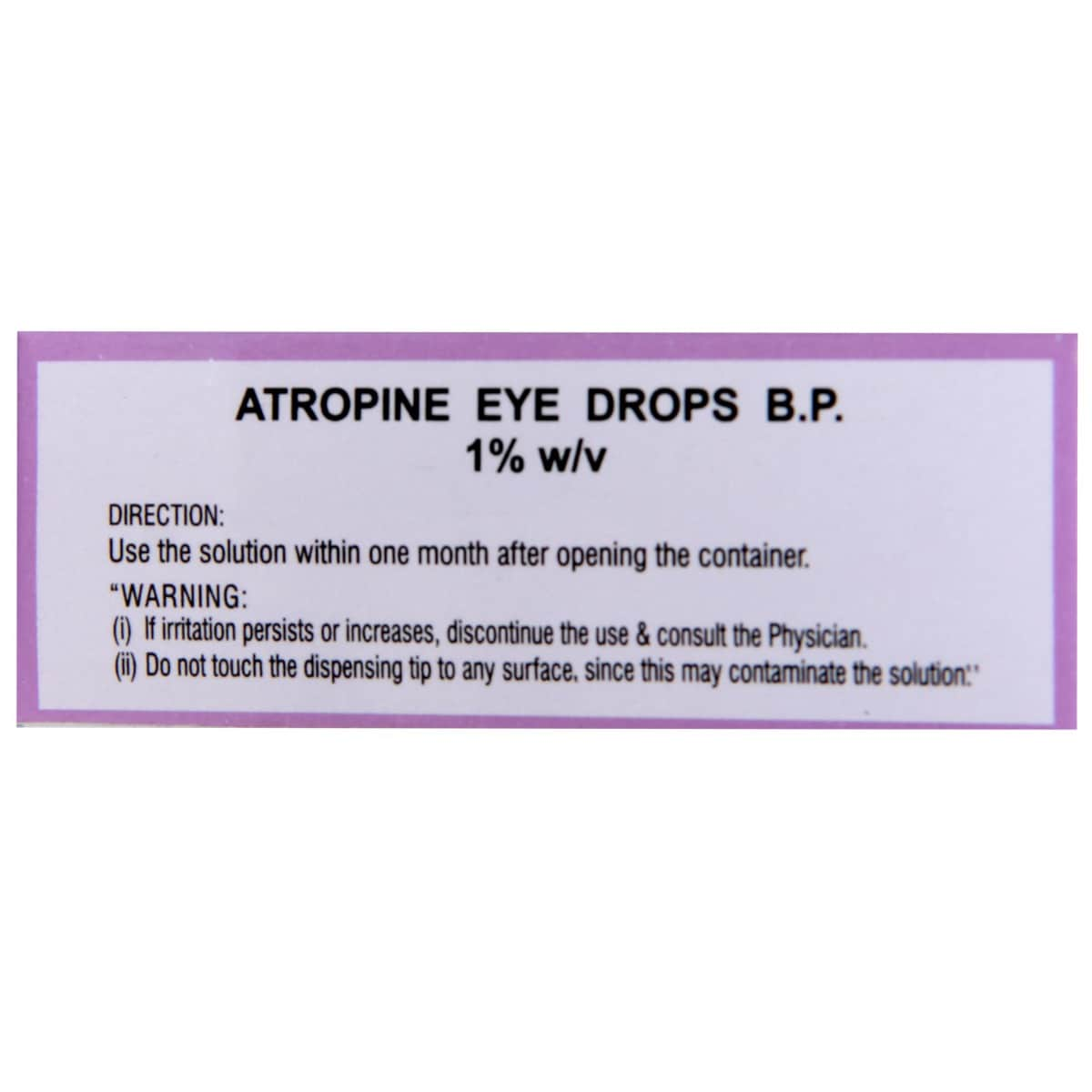Atropine Eye Drops 10 ml
Atropine Eye Drops is used to treat uveitis or iritis (inflammation in the eye), cycloplegia (paralysis of the ciliary eye muscle), myopia (near-sightedness), amblyopia (decreased eyesight due to abnormal vision development), to widen the pupil before certain eye examinations and convergent strabismus (cross-eyes or squint). Atropine Eye Drops relaxes the muscles in the eye, thereby making the pupil appear larger. This makes it easier for an eye examination. It also reduces pain and allows the inflamed part of the eye to rest and recover by relaxing the eye muscles.
₹36.1*
MRP ₹41
12% off
₹36.08*
MRP ₹41
12% CB
₹4.92 cashback(12%)
Free Delivery
With Circle membership
(Inclusive of all Taxes)
This offer price is valid on orders above ₹800. Apply coupon PHARMA10/PHARMA18 (excluding restricted items)
Know Your Delivery Time
Provide Delivery Location



Available Offers
 Prescription drug
Prescription drugWhats That

Secure Payment

India's Most Trusted Pharmacy

Genuine Products
Composition :
Manufacturer/Marketer :
Consume Type :
Return Policy :
Expires on or after :
About Atropine Eye Drops
Atropine Eye Drops belongs to a group of medicines called mydriatics and cycloplegics used to treat uveitis or iritis (inflammation in the eye) and myopia (near-sightedness). It is also indicated for cycloplegia (paralysis of the ciliary eye muscle), mydriasis (dilation of the pupil), and the penalisation of the healthy eye in the treatment of amblyopia (decreased eyesight due to abnormal vision development). Besides this, Atropine Eye Drops is also used before certain eye examinations to widen the pupil and to diagnose eye problems such as blurred vision in children below 6 years and in children with convergent strabismus (cross-eyes or squint).
Atropine Eye Drops contains ‘atropine’, which relaxes the muscles in the eye, thereby making the pupil of the eye appear larger. This makes it easier for an eye examination. Atropine Eye Drops reduces pain and allows the inflamed part of the eye to rest and recover by relaxing the eye muscles.
You are advised to use Atropine Eye Drops for as long as your doctor has prescribed it for you, depending on your medical condition. In some cases, you may experience certain common side effects such as dry mouth, palpitations, nausea, constipation, and vomiting. Most of these side effects do not require medical attention and will resolve gradually over time. However, you are advised to talk to your doctor if you experience these side effects persistently.
Consult a doctor before using Atropine Eye Drops if you are pregnant or breastfeeding. Atropine Eye Drops might cause blurred vision; so, avoid driving or operating machinery until your vision is clear. Avoid touching the tip of the dropper as it may contaminate the contents. Always wash your hands after use. Keep your doctor informed about your health condition and the medicines you are taking to prevent any side effects/interactions.
Uses of Atropine Eye Drops
Directions for Use
Medicinal Benefits
Atropine Eye Drops belongs to a group of medicines called mydriatics and cycloplegics used to treat uveitis or iritis (inflammation in the eye) and myopia (near-sightedness). Besides this, Atropine Eye Drops is also used before certain eye examinations to widen the pupil, to diagnose eye problems such as blurred vision in children below 6years and in children with convergent strabismus (cross-eyes or squint). Atropine Eye Drops relaxes the muscles in the eye, thereby makes the pupil of the eye appear larger. This makes it easier for an eye examination. Atropine Eye Drops reduces pain and allows the inflamed part of the eye to rest and recover by relaxing the eye muscles. It is also indicated for cycloplegia (paralysis of the ciliary eye muscle), mydriasis (dilation of the pupil), and for the penalisation of the healthy eye in the treatment of amblyopia (decreased eyesight due to abnormal vision development).
How Atropine Eye Drops Works
Storage
Side Effects of Atropine Eye Drops
- Dry mouth
- Palpitations
- Nausea
- Constipation
- Vomiting
- Mild stinging sensation in the eye
What if I have taken an overdose of Atropine Eye Drops
Drug Warnings
Do not use Atropine Eye Drops if you are allergic to any of its components, if you have closed-angle or narrow-angle glaucoma. Inform your doctor if you have a fever, heart problems, glaucoma, ocular hypertension, kidney or liver problems. Consult a doctor before using Atropine Eye Drops if you are pregnant or breastfeeding. Atropine Eye Drops might cause blurred vision; so, avoid driving or operating machinery until your vision is clear. Inform your doctor if you haven’t had your eyes checked recently.
Drug-Drug Interactions
Drug-Drug Interactions
Login/Sign Up
Using Atropine Eye Drops 10 ml together with umeclidinium may increase side effects (drowsiness, blurred vision, dry mouth, heat intolerance, flushing, decreased sweating, difficulty urinating, abdominal cramping, constipation, rapid heartbeat, confusion, memory problems, and glaucoma - an eye disease that causes vision loss in one or both eyes).
How to manage the interaction:
Although taking Atropine Eye Drops 10 ml and Umeclidinium bromide together can cause an interaction, it can be taken if a doctor has suggested it. If you experience drowsiness, blurred vision, dry mouth, heat intolerance, flushing, decreased sweating, difficulty urinating, abdominal cramping, constipation, rapid heartbeat, confusion, memory problems, and glaucoma - an eye disease that causes vision loss in one or both eyes. Do not stop using any medications without talking to a doctor.
Coadministration of Atropine Eye Drops 10 ml and Zonisamide can cause increased body temperature and decreased sweating.
How to manage the interaction:
Although taking Atropine Eye Drops 10 ml and Zonisamide together can result in an interaction, it can be taken if a doctor has advised it. However, if you experience drowsiness, dizziness, or lightheadedness, or if you have reduced sweating or a fever, consult a doctor immediately. Avoid tasks that need mental attention, such as driving or operating dangerous machinery. Do not discontinue any medications without consulting a doctor.
Taking potassium citrate oral tablets or capsules with Atropine Eye Drops 10 ml may increase the irritating effects of potassium on stomach and upper intestine.
How to manage the interaction:
Taking Atropine Eye Drops 10 ml with potassium citrate together can result in an interaction, it can be taken if a doctor has advised it. However, if you happen to experience severe abdominal pain, bloating, sudden dizziness or lightheadedness, nausea, vomiting (especially with blood), loss of appetite, and/or black, tarry stools, consult the doctor. Do not discontinue any medications without consulting a doctor.
Coadministration of Pramlintide with Atropine Eye Drops 10 ml can increase the risk of reduced movement in the digestive system.
How to manage the interaction:
Taking Atropine Eye Drops 10 ml with Pramlintide together can result in an interaction, but it can be taken if a doctor has advised it. Do not stop using any medications without talking to a doctor.
When Atropine Eye Drops 10 ml and Topiramate are taken together it can cause increased body temperature and decreased sweating.
How to manage the interaction:
Although taking Atropine Eye Drops 10 ml and topiramate together can result in an interaction, it can be taken if a doctor has advised it. However, if you experience drowsiness, dizziness, or lightheadedness, or if you have reduced sweating or a fever, consult a doctor immediately. Avoid tasks that need mental attention, such as driving or operating dangerous machinery. Do not discontinue any medications without consulting a doctor.
When Atropine Eye Drops 10 ml is used with solifenacin may cause side effects (drowsiness, blurred vision, dry mouth, heat intolerance, flushing, decreased sweating, difficulty urinating, abdominal cramping, constipation, irregular heartbeat, confusion, and memory problems).
How to manage the interaction:
Co- administration of Atropine Eye Drops 10 ml with solifenacin can lead to an interaction, it can be taken if a doctor has advised it. However, if you experience drowsiness, blurred vision, dry mouth, heat intolerance, flushing, reduced sweating, trouble urinating, abdominal cramps, constipation, irregular heartbeat, disorientation, and memory issues, consult the doctor. Avoid tasks that need mental attention, such as driving or operating dangerous machinery. Do not stop using any medications without talking to a doctor.
Using Hydromorphone together with Atropine Eye Drops 10 ml may increase the risk and/or severity of some side effects (dizziness, drowsiness, confusion, difficulty concentrating, difficulty urinating, dry mouth, abdominal cramping, and constipation).
How to manage the interaction:
Although taking Hydromorphone and Atropine Eye Drops 10 ml together can cause an interaction, it can be taken if a doctor has suggested it. If you have any of these symptoms, it's important to contact a doctor right away: trouble peeing, feeling dizzy or sleepy, feeling confused or having trouble focusing, dry mouth, constipation, or feeling less mentally sharp. Do not discontinue any medications without consulting a doctor.
When Secretin human is used with Atropine Eye Drops 10 ml, the therapeutic efficacy of Secretin human can be decrease.
How to manage the interaction:
Although there is a possible interaction between Atropine Eye Drops 10 ml and Secretin, you can take these medicines together if prescribed by a doctor. Do not discontinue any medications without consulting a doctor.
Co-administration of Atropine Eye Drops 10 ml with Potassium chloride oral tablets or capsules can increase the risk of stomach ulcers, bleeding, and other gastrointestinal injury.
How to manage the interaction:
There may be a possibility of interaction between Atropine Eye Drops 10 ml and Potassium chloride, but it can be taken if prescribed by a doctor. If you have any of these symptoms, it's important to contact the doctor right away: severe stomach pain, bloating, sudden lightheadedness or dizziness, nausea, vomiting(especially with blood), decreased hunger, dark, tarry stools. Do not discontinue any medications without a doctor's advice.
Drug-Food Interactions
Drug-Food Interactions
Login/Sign Up
Diet & Lifestyle Advise
- Eat a balanced diet.
- Avoid smoking.
- Include fish, nuts, legumes, citrus fruits, green leafy vegetables, carrots, sweet potatoes, and eggs, as they help improve eyesight.
- Get regular eye examinations done.
- Always wash your hands before applying contact lenses.
- To prevent digital strain, look away every 20 minutes for 20 seconds at something 20 feet away.
- Reduce screen time. Avoid staring at digital screens for a long time.
- Avoid touching your eyes with dirty hands as it might cause infection.
Habit Forming
Therapeutic Class
Atropine Eye Drops Substitute

Topin 1% Eye Drops 10 ml
₹3.96per tabletAtrop Eye Drops 5 ml
₹3.70per tabletAtropine 1% Eye Drop 5 ml
₹3.60per tabletAtro Drops 5ml
₹2.97per tabletTopin 1% Eye Drops 5 ml
₹2.81per tablet
Product Substitutes
Alcohol
Caution
It is not known if alcohol interacts with Atropine Eye Drops. Please consult your doctor if you have any concerns.
Pregnancy
Caution
Please consult your doctor if you have any concerns regarding this; your doctor will prescribe only if the benefits outweigh the risks.
Breast Feeding
Caution
Consult your doctor before using Atropine Eye Drops if you are breastfeeding. Your doctor will decide if Atropine Eye Drops can be used by breastfeeding mothers or not.
Driving
Unsafe
Atropine Eye Drops might cause blurred vision. So, avoid driving or operating machinery until your vision is clear.
Liver
Caution
Please consult your doctor if you have any concerns regarding the usage of Atropine Eye Drops in patients with liver impairment.
Kidney
Caution
Please consult your doctor if you have any concerns regarding the usage of Atropine Eye Drops in patients with kidney impairment.
Children
Safe if prescribed
Atropine Eye Drops should be used in children only if prescribed by the doctor.
FAQs
Country of origin
Manufacturer/Marketer address
Customers Also Bought
Disclaimer
Author Details
We provide you with authentic, trustworthy and relevant information














